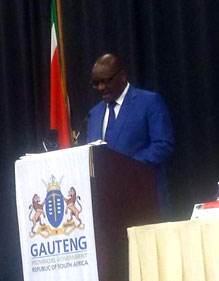
Would a regiment of ethics officers that cuts across government’s multiple departments and their agencies help curb the growing presence of corruption in the public service?
Gauteng premier David Makhura seems to think so, and he has roped in the national department of public service and administration to help infuse this system into the province’s core departments and their entities.
Speaking at the Gauteng Anti-Corruption Summit 2014 in Johannesburg on Friday, Makhura said departments are required to create and promote an ethical organisational culture and to provide guidelines on how every member of the department should behave.
“It is my firm conviction that we can build a future free from corruption, only if we work together as reliable partners who are determined to win the war on corruption,” he said. “Corruption is a crime against the poor, and it has to be fought with all the weapons at our disposal.”
Under the theme Strengthening good governance and enhancing integrity in Gauteng, the event took an interactive approach where delegates led the process of drawing up resolutions to ensure change.
Makhura encouraged this and said: “It is a problem that requires a comprehensive, holistic and united response and action by different sectors of society.
“Coming a few months after the start of the fifth administration in our province, the anti-corruption summit will not be a talk shop.”
Decisive action against corruption
In his state of the province address in June, Makhura announced that his government would not only talk about corruption, but would “take decisive action against government officials and business people in our province, particularly those who do business with government.”
Makhura referred to the Gauteng City Region Observatory quality of life survey, conducted in 2013 among residents of Gauteng. The three most common concerns raised were corruption as a threat to democracy; failure by senior public service managers to declare their interests outside their work, and the number of senior government officials doing business with the state.
Maswahle Diphofa, director-general of the public service and administration department, also cited the value in having ethics offices across government units. “The vision is that over time we will have a cohort of very capable officials who live and breathe integrity … we can get to a point where we can easily say ‘when in doubt, ask your ethics officer’.”
Diphofa argued the importance of viewing the value of integrity from a holistic perspective, and realising that crimes against a firm integrity system do not only happen in the public sector, but across many other sectors of society.
“Ethical dilemmas are not only unique to the government, but they apply and occur in all other sectors … the public service is just one of the pillars of a national integrity system.”
It is just as important as other pillars in terms of contributing towards the creation of an ethical society, he added. “Other pillars include Parliament, the private sector, civil society, the judiciary and constitutional bodies, among others.”
The culture that prevails in the public service is important, he said. “Ethical leadership and the exemplary rule of senior officials from the public and private sectors is key to the effective promotion of ethics and values in society as a whole.”
“Government pays too much for things that can be done cheaper”
Interventions proposed for Gauteng and mentioned by Makhura include :
- the inclusion of anti-corruption indicators in the performance contracts of all line departments, particular our senior officials, heads of department and director generals.
- addressing operational challenges which include budgetary constraints, inadequate staff, establishing dedicated anti-corruption units within departments and low capacities in terms of skills for some departments.
- recruiting qualified, competent, dedicated and experienced human resources to intensify the fight against corruption in the province.
- rewarding those who report cases of alleged corruption that are successfully investigated with the portion of money that has been recovered from the perpetrators.
Furthermore, the premier announced the introduction of an open tender system that will be operational in the province, the launch of which was expected on Monday.
“Members of the public will know who has qualified, why they qualified,” he said. “The more open these processes are, the more we will be able to eliminate all the fraudsters and those who use the tender processes to empower their friends or business partners.
“Government pays too much for things that can be done cheaper.”
The 20-year review released by the Presidency, said Makhura, concluded that “corruption impedes service delivery and development. It further undermines public confidence in the state and its institutions.”
He said that there is a commitment to work with law enforcement agencies as well as chapter nine and 10 institutions, in addressing the challenges of ensuring integrity and clean governance as the cornerstones of the administration.
“Public servants who do not want to declare their interests do not belong to the public service in our province. We don’t want reports [from the Public Service Commission] saying ‘you have a large number of senior officials who do not want to declare’. If you don’t want to declare, you don’t belong in the public service.
“It is important that we confront this, because if we cannot do it with our officials, then we’re setting a very dangerous precedence with our society.”

